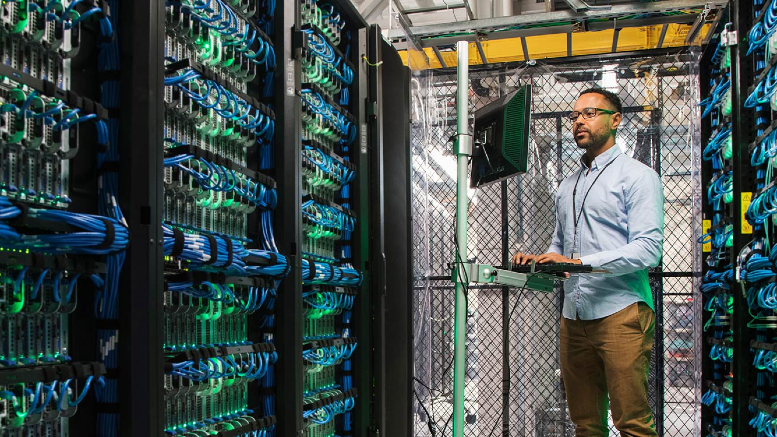Results of 2020 Unisys Security Index™: Staying Safe. Staying Connected. Staying Secure.
June 24, 2020 / Unisys Corporation
Over the past several months, the world has faced a once-in-a-generation event − a global virus that has kept us quarantined in our homes, moved work and shopping online and brought about fundamental changes to our attitudes toward security. The theme of the 2020 Unisys Security Index™ – “Staying Safe. Staying Connected. Staying Secure.” – is now more important than ever. Will countries around the world turn inward to protect their citizens and economies? What will become of education? Will the way we interact with one another, both in-person and virtually, change? Will working remote become the new norm? A pandemic of this scale will shape the world for many years to come, and some repercussions are still yet to be seen.
The Unisys Security Index™ has tracked consumer security concerns over personal, financial, national and internet security for 14 years, and we are seeing some major shifts in this year’s findings.
Key findings and takeaways
The world remains on edge. In evaluating data from the 2020 Unisys Security Index™, it is clear that global security concerns remain at their highest level since the inaugural index was launched in 2007.
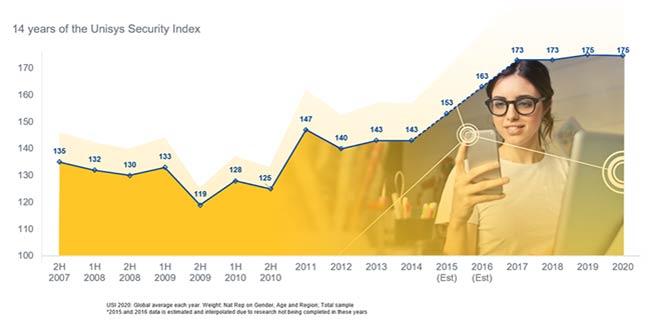
Consumers have shifted focus away from internet and financial security concerns to national security and personal security despite spikes in COVID-19-related cyberattacks. This is largely driven by rising concern about disasters/epidemics and personal safety.
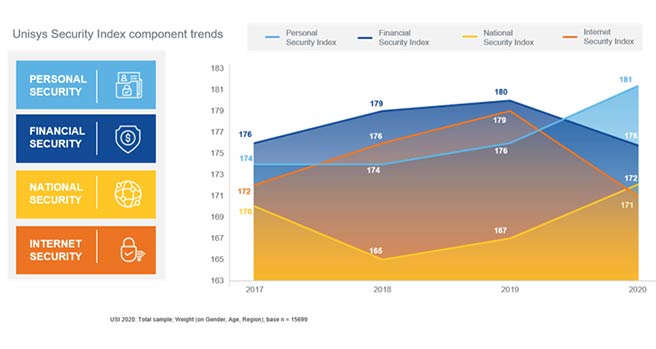
In a pandemic world, consumers have taken their focus off online risks. Against the backdrop of COVID-19, consumers are narrowing their attention to their families’ health (67% seriously concerned) as well as to their country’s economic stability (66%) and health infrastructure (64%). In contrast, internet security issues such as the risk of being scammed (45% seriously concerned) or experiencing a data breach while working remotely (41%) are the least-concerning risks relating directly to the pandemic. This is especially concerning given the added vulnerabilities associated with working from home – from unsecured home wi-fi networks to virtual conferences that reveal personal information such as photos and home settings and phishing scams that impersonate government organizations or employers. Online crimes reported to the FBI’s Internet Crime Complaint Center (IC3) have increased by 400% as a result of the pandemic, with as many as 4,000 incidents per day. This is no time to take our eyes off internet security.
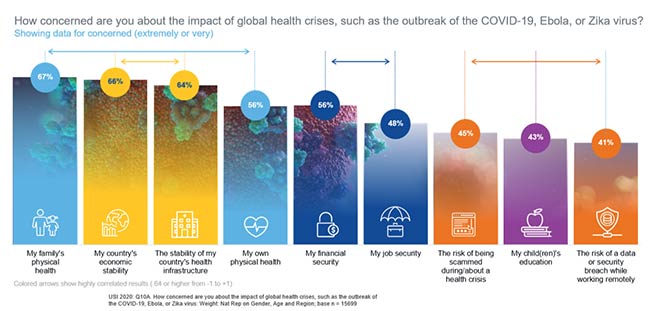
Global differences are larger than ever. The 2020 Unisys Security Index™ also found that while the overall ranking of countries’ security concerns remains broadly consistent, the gap has widened between the countries feeling the most and least concern. Developing countries tend to be more concerned than developed countries1, and this distinction has become more marked in 2020. The disparity between the most concerned country (the Philippines, at 238) and the least concerned country (the Netherlands, at 100) has grown by 19 points since 2017.
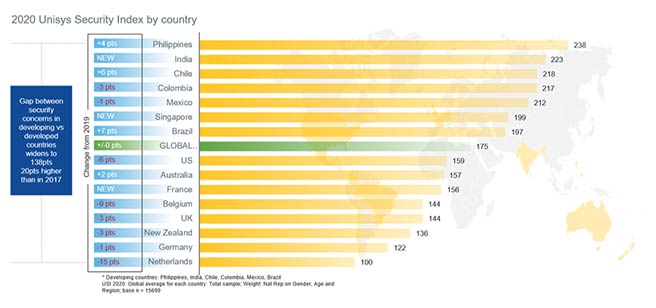
Security concerns are higher among females, those who are under 35 years old, lower-income earners and college-educated respondents. The survey found concern was 11 points higher among women than men and 19 points higher among 18-to-24-year-olds than respondents aged 55 to 65. The level of concern for U.S. respondents with lower incomes was 6 points higher than higher-income respondents.
According to the U.S. Census Bureau, nearly half of adults 18 and over have lost employment income either themselves or through another adult in their household. For many women, particularly those with children at home, the pandemic has magnified challenges they have long faced as they juggle career and family.
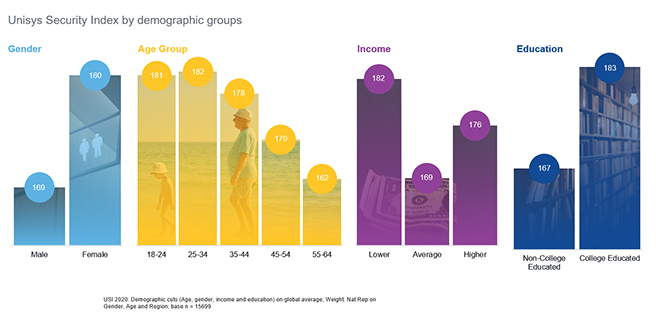
What can organizations do to protect themselves?
The following are a few tangible steps organizations can take:
- Go beyond VPN. Adopt Zero Trust (i.e. never trust, always verify) secure network access to better protect your remote workforce and your company.
- Connect and educate your remote employees on both well-being and new security procedures.
- Utilize emerging technologies, including multi-factor authentication using biometrics, to extend safety precautions.
- Look beyond “winning” with security and focus on building resilience and trust.
- Be forward-facing – prioritize and implement the adoption of next-generation cyber tools such as artificial intelligence to quickly identify, isolate and remediate threats in seconds.
Please take a few moments and check out our new 2020 Unisys Security Index™ site. From here, you can access detailed survey results, view subject matter expert videos and review data that is both global and country-specific from Australia, Belgium, Brazil, Chile, Colombia, France, Germany, India, Mexico, Netherlands, New Zealand, Philippines, Singapore, Spain, the UK and the U.S.
Staying Safe. Staying Connected. Staying Secure. These are all crucial, now more than ever.
Discover how Unisys can empower your organization to unlock the limitless potential of AI to make swift, data-driven decisions, automate tasks, streamline processes and free up valuable employee time for strategic initiatives.
1 The Unisys Security Index™ defines a “developed” country as one in which the gross domestic product per capita is $12,000 or more.






